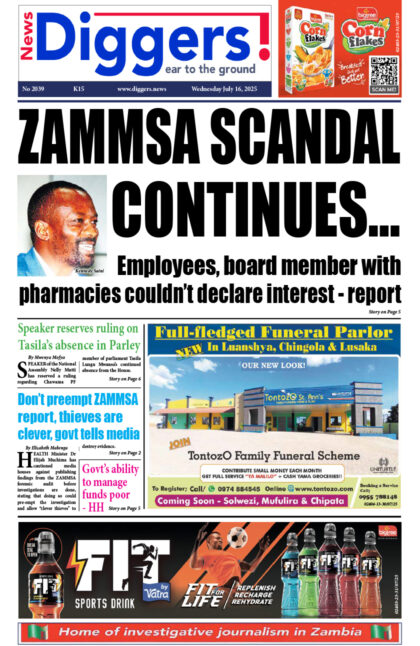A DEC Investigations Officer Lusungu Muzenje has admitted in the Lusaka Magistrates’ Court that during their operation, non of the seven court officials and two businessmen, were found with the cocaine that they are accused of trafficking and possessing.
And defence lawyer Keith Mweemba says the reason why DEC did not use video evidence in their operation is because they didn’t want to be exposed that they planted the drugs on the accused persons.
In this matter, businessmen Eric Chipango, Emmanuel Chimba and court officials Emmanuel Chirwa, Bearvan Mengo, Mathews Mukanda, Victor Nzaila, Florence Mushoka, O’Brian Muyunda and Didie Kangwa, a senior clerk of court, are charged with four counts of trafficking in narcotic drugs and two counts of theft by servant.
The accused persons are charged with one count of trafficking in 80.11 grams of cocaine without lawful authority and another count of trafficking in 1 Kg of cocaine without lawful authority.
Chimba, a businessman and Chirwa a court interpreter are facing another count of trafficking in 1.5 grams of cocaine without lawful authority.
Chirwa is also facing one more count of trafficking in 4.5 grams of cocaine without lawful authority and another count of theft by servant where he’s alleged to have stolen 4.5 grams of cocaine, the property of the government of Zambia.
Meanwhile, all the seven court officials are charged with one count of theft by servant where they are alleged to have stolen 24 kilograms of cocaine between August 4, 2017 and August 9, 2018, the property of the government of Zambia.
At the previous sitting, Muzenje, 42, had produced nine sachets of cocaine, plus another small sachet of the said drug in a black plastic, as his evidence.
And when the matter came up before magistrate Victoria Chitulangoma for cross examination, Tuesday, the witness admitted that DEC did not find the accused persons with the quantity of cocaine that they are charged with, during the entire operation.
He added that they did not find any of the accused persons buying or selling the said cocaine.
Muzenje further said there was no preliminary chemical examinations in the field to determine whether the drugs they allege to have found was cocaine.
Meanwhile, defence counsel Keith Mweemba noted that it was unreasonable for DEC to have charged the accused persons with trafficking in drugs, the same quantity as that which was destroyed two years ago.
“So you can charge someone with trafficking in drugs which don’t exist, do you have that power? It is a fact that you have not identified any drugs on these counts because they don’t exist. Yet these people are in custody because of these same malicious charges where you have not identified any drugs of that magnitude,” he said.
And Mweemba disclosed that DEC had continued to investigate the matter even when it was already in court.
Asked by Mweemba whether he had documentary evidence to exclude the dangers of planting the drugs on the accused, Muzenje said he didn’t have any.
He further said DEC did not gather video evidence during their operation because the office only has one camera and at that time it was being used in other operations.
At this point, Mweemba took Muzenje to task saying the duty of providing video evidence was on them, as DEC.
He further accused them of planting drugs on the accused.
“Video evidence is one of the ways of excluding the dangers of planting drugs. That duty of providing video evidence is on you as DEC. You did not gather video evidence, yet you have the facilities. If this video evidence was there, the allegation of you planting drugs on the accused would have been put to rest. Otherwise you planted those drugs,” he said.
“The reason why you omitted all these important aspects was to make sure that you were not exposed that you planted these drugs on these people. You planted these drugs. You already knew that even if you put these people in custody, this cocaine will turn up positive upon being tested.”



















